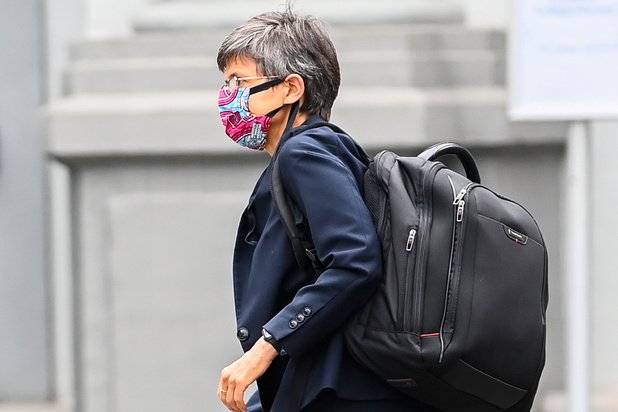Last week the governor of Antwerp province, Cathy Berx (CD&V) introduced a curfew for the whole province in response to the local increase in cases of Covid-19.
The curfew was one of a set of measures announced by Berx, including a general obligation to wear a face mask, with fines of up to €1,600 for those who break the rules, or a prison term of up to 14 days in severe cases.
The curfew runs from 11:30 PM to 6:00 AM, during which time no-one is allowed outside unless absolutely essential. All restaurants and bars must close at 11:00 PM to allow patrons to be home on time.
The measure has caused some distress in the municipalities of the province other than the city of Antwerp itself, who point out that the worst increase in cases of infection are in the city and not in their more peaceful towns.
However there is a growing concern over the very legality of the curfew itself. Is it lawful, and does the governor have the authority to force people off the streets on pain of a fine, let alone a prison sentence?
Berx had to delay the introduction of her measures for one day because the legal text was not ready on time. When she produced the order, it was in the form of a 17-page police ordinance, based on two legal grounds: Article 128 of the Provinces Act and Article 23 of the Ministerial Decree of 30 June 2020 – the overall decree approved by the national security council.
That legal authority is taken apart in an opinion piece on the Apache news website written by three lawyers, Zohra Othman, Raf Jespers and Jan De Lien.
Article 128, they argue, gives the governor the power to maintain public order in the province, namely public peace, safety and health.
“The question is whether public order is actually problematic today. The question is also whether the power of the governor extends beyond enlisting the police, and whether this article gives her the power to declare 12 measures, including the curfew.”
The jurisprudence on that matter is not extensive, they admit, but conclude that Article 128 does not allow the governor to do as far as Berx has.
And the inclusion of Article 23 of the ministerial decree does not clear things up.
That article allows the government, in consultation with the governor, to give the power to take special preventive measures to the mayors. But the governor herself cannot assume special powers from the article.
If it is legal, is it necessary?
Another legal opinion, this time published on the VRT website by ethicist Raf Geenens, political philosopher Stefan Rummens and constitutional specialist Stefan Sottiaux – all of the University of Leuven, looks at the issue from another angle. Is the curfew even necessary?
“The police regulation of Antwerp governor Cathy Berx justifies that curfew by arguing that evening parties and social festivities help spread the virus,” they write.
“However, those festivities have already been banned by the federal ban on gathering and the curtailment of social bubbles. In principle, curfew does not add anything to the fight against the virus; it can at most facilitate the enforcement of the other measures.”
The point is picked up by political scientist (and Antwerp resident) Dave Sinardet.
“This is overshooting. A signal is needed, but in this case you may wonder if it is not disproportionate. The impression is that politicians mainly want to show that they can manage strictly, especially after the failure of contact tracing. Surely there must be better means than a curfew to discourage young people who want to drink at night in a square.”
Sinardet is not alone in pointing out that the Antwerp curfew is the first time such a measure has been used since the Nazi occupation – not even after Belgium was hit by terrorist attacks in 2016.
In one sense, the curfew is “a form of symbolic politics,” while on the other it sets a dangerous precedent.
“There is a chance that if we find the curfew legitimate and ordinary, it will be seized upon more quickly in the future,” he said.
However the legalities of the measure will be contested – if at all – before the Council of State, which is there to scrutinise all government activity from federal to provincial to municipal.
But there is more than law involved, conclude Othman, Jespers and De Lien.
“Even if the governor has jurisdiction, the question remains whether curfew is a necessary and proportional measure and whether other less drastic measures cannot have the same effect. In addition to a legal debate, this is also a social debate.”
Alan Hope
The Brussels Times

